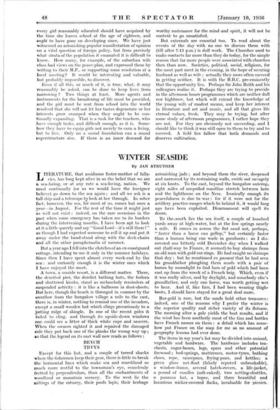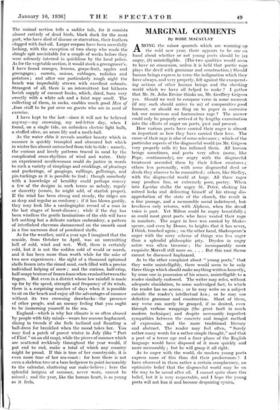WINTER SEASIDE
By JAN STRUTHER
LITERATURE, that assiduous foster-mother of falla- cies, has long kept alive in us the belief that we are a sea-faring, or at any rate a sea-loving, nation. We must continually (or so we would have the foreigner believe) go down to the sea again ; and all we ask is a tall ship and a telescope to look at her through. In sober fact, however, the sea, for most of us, comes but once a year—in August. For the rest of the time it might just as well not exist : indeed, on the rare occasions in the past when some emergency has taken me to its borders during the intervening months, I have been apt to look at it a little queerly and say " Good Lord—it's still there !" as though I had expected someone to roll it up and put it away under the band-stand along with the deck-chairs and all the other paraphernalia of summer.
But a year ago I fell into the clutches of an ex-coastguard cottage, intending to use it only in .the summer holidays. Since then I have spent almost every week-end by the sea : and curiously enough it is the winter ones which I have enjoyed the most.
A town, a seaside resort, is a different matter. There, the deserted pier, the derelict bathing huts,. the forlorn and shuttered kiosks, stand as melancholy reminders of suspended activity : it is like a ballroom in dust-sheets. But here, though the beach is thronged in summer by the overflow from the bungalow village a mile to the east, there is, in winter, nothing to remind one of the invaders, except a small wooden but which clings precariously to a jutting ridge of shingle. In one of the recent gales it failed to cling, and through its upside-down windows one could see a litter of thick white cups and saucers. When the owners righted it and repaired the damaged side they put back one of the planks the wrong way up ; so that the legend on its east wall now reads as follows : BEACH TRVYS Except for this hut, and a couple of tarred shacks where the fishermen keep their gear, there is little to break the horizontal lines which make sea and marshland so Much more restful to the townsman's eye, ceaselessly fretted by perpendiculars, than all the enchantments of woodland or mountain scenery. To the west lie the saltings of the estuary, their pools lapis, their herbage astonishing jade ; and beyond them the river, deepened and narrowed by its restraining walls, swirls out savagely at six knots. To the east, beyond the bungalow outcrop, eight miles of unspoiled coastline stretch between here and the lighthouse on the Ness. Ironically enough its peacefulness is due to war : for if it were not for the artillery practice-ranges which lie behind it, it would long ago have been exploited. Disarmament will spell its doom.
To the .south lies the sea itself, a couple of hundred yards away at high-water, but at the low springs nearly a mile. It comes in across the flat sand not, perhaps, " faster than a horse can gallop," but certainly faster than a human being can wade in gumboots : as I dis- covered one bitterly cold December day when I walked out (half-way to France, it seemed) to buy shrimps from an old man with gold ear-rings. He had caught no shrimps that day : but he mentioned en passant that he had seen his grandfather ploughing them sands with a pair of horses by moonlight to find bars of gold which had been cast up from the wreck of a French brig. Which, even if it was really silver, and by daylight, and somebody else's grandfather, and only one horse, was worth getting wet to hear. And if, like him, I had been wearing thigh, boots, I should have stayed for a great deal more.
Bar-gold is rare, but the sands hold other treasures : indeed, one of the reasons why I prefer the winter is the superior quality and richer variety of its flotsam. The morning after a gale yields the best results, and if the wind has been southerly most of the tins and bottles have French names on them : a detail which has some- how put France on the map for me as no amount of geography lessons had ever done.
The items in my year's list may be divided into animal, vegetable and hardware. The hardware includes tea- chests, sugar-boxes, logs, spars and other potential firewood ; bed-springs, mattresses, motor-tyres, bathing shoes, rope, saucepans, frying-pans, and kettles; a green glass net-float (falsely reputed unbreakable), a window-frame, several hatch-covers, a life-jacket, a pound of candles (salt-caked), two netting-shuttles, a panama hat, a topee, and three beautiful and luxurious wicker-covered flasks, invaluable for picnics. The animal section tells a sadder tale, for it consists almost entirely of dead birds, black duck for the most part, who have died of disease or starvation, their feathers clogged with fuel-oil. Larger corpses have been mercifully lacking, with the exception of two sheep who made the shingle spit unvisitable for a couple of weeks before they were solemnly interred in quicklime by the local police. As for the vegetable section, it would stock a greengrocer's. I have found oranges, lemons, grape-fruit, apples and greengages ; carrots, onions, cabbages, radishes and potatoes ; and after one particularly rough night the beach was improbably strewn with excellent cobnuts. Strangest of all, there is' an intermittent but hitherto lavish supply of coconut husks, which, dried, burn very sweetly with a white ash and a faint ropy smell. The collecting of them, in sacks, enables much good Man of Aran stuff to be put over on guests who are in need of exercise.
I have kept to the last—since it will not be believed anyway—my crowning, my red-letter day, when I found, on a single tide, an unbroken electric light bulb, a stuffed olive, an arum lily and a moth-ball.
As the water ebbs it reveals another beauty which in summer is quickly trampled and obscured but which in winter lies almost untouched from tide to tide : namely, the curious and lovely patterns traced in sand by the complicated cross-rhythms of wind and water. Only an experienced needlewoman could do justice in words to such a variety of rimplings and crinklings, of pleatings and puckerings, of gaugings, rufflings, gofferings, and pin-tuckings as it is possible to find ; though somebody with a knowledge of heraldry could perhaps convey a few of the designs in such terms as nebuly, raguly or dancetty (semee, he might add, of starfish proper). If the, wind has been strong and steady, the ridges are as deep and regular as corduroy ; if it has blown gustily, they may look like a cardiographic record of a man in the last stages of heart-disease ; while if the day has been windless the gentle laminations of the ebb will have left nothing but a delicate surface embroidery, a pattern of interlinked chevrons damascened on the smooth sand in a fine nacreous dust of powdered shells.
As for the weather, until a year ago I imagined that the seaside, from October to April, was an unremitting 'hell of cold, wind and wet. Well, there is certainly cold, but it is not the sodden cold of weald or marsh, and it has been more than worth while for the sake of two new experiences : the sight of a thousand upturned shells frozen into the rimed sand, each filled with a precise individual helping of snow ; and the curious, half-crisp, half-soapy texture of frozen foam when crushed between the fingers. But even in a district whose low rainfall is made up for by the speed, strength and frequency of its winds, there is a surprising number of days when it is possible to sit on the beach' and enjoy all the advantages of summer without its two crowning drawbacks—the presence of other people, and an uneasy feeling that you ought to be immersing yourself in the sea.
England—which is why her climate is so often abused by people with tidy minds—wears her seasons haphazard, dining in tweeds if she feels inclined and flaunting a ball-dress for breakfast when the mood takes her. You may find a patch of purest winter in July (like " Part of Flint " on an old map), while the pieces of summer which are scattered recklessly throughout the year would, if put end to end, make a total of which any country might be proud. If this is true of her countryside, it is even more true of her sea-coast : for here there is not even a skeleton tree or a bare hedgerow to point inexorably to the calendar, shattering our make-believe ; here the splendid insignia of summer, never worn, cannot be missed ; and the year, like the human heart, is as young as it feels.











































 Previous page
Previous page